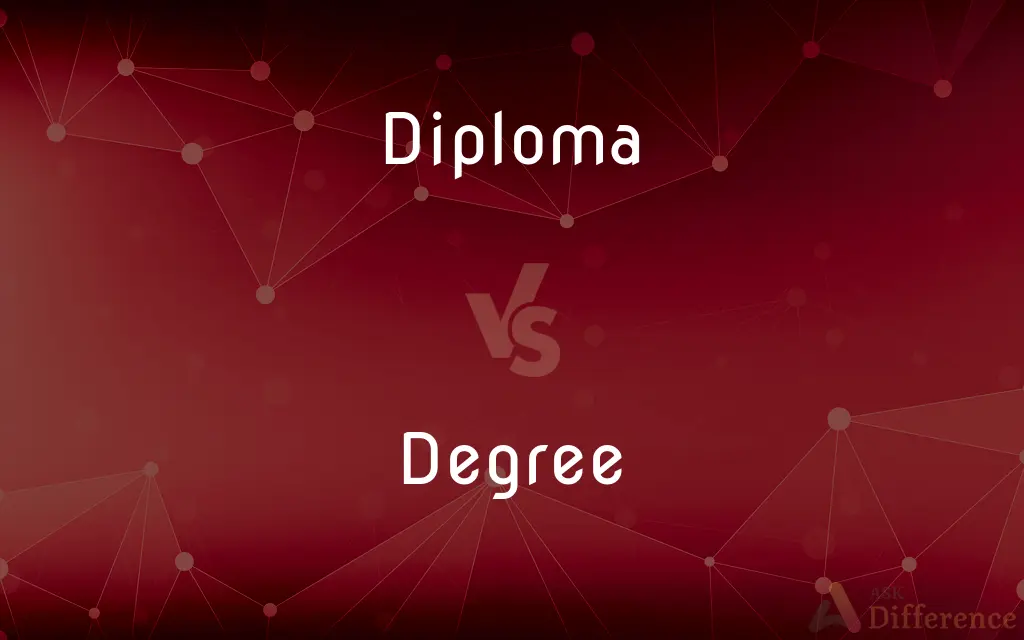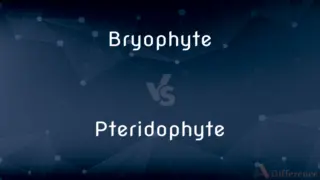Diploma vs. Degree — What's the Difference?
By Tayyaba Rehman & Maham Liaqat — Updated on March 25, 2024
A diploma is a certification offered by educational institutions to signify proficiency in a specific field, often vocational, while a degree is an academic award for completing a broader course of study at a college or university.

Difference Between Diploma and Degree
Table of Contents
ADVERTISEMENT
Key Differences
Diplomas are typically focused on practical skills and vocational training, designed to prepare students for specific careers. Degrees, on the other hand, provide a comprehensive education that includes theoretical knowledge, critical thinking skills, and in-depth study in a particular discipline.
While diploma programs can vary in length, they are generally shorter than degree programs. Diploma programs may last from a few months to three years, depending on the field and level of expertise required. Conversely, degree programs have a more standardized duration, with associate degrees taking about two years, bachelor’s degrees four years, and graduate degrees (master’s and doctoral) requiring additional years of study.
The entry requirements for diploma programs are often less stringent than for degree programs. Diplomas may require a high school diploma or equivalent, whereas degree programs, especially at the bachelor's level and above, have more rigorous admission criteria, including previous academic performance and standardized test scores.
Diploma programs are career-oriented, offering hands-on experience and training that directly prepare students for employment in specific fields. Degree programs, while also enhancing employability, emphasize a broader educational experience that can include research, internships, and elective courses outside the major area of study.
The value of a diploma versus a degree can depend on the industry and career path. In some fields, a vocational diploma may be sufficient for entry-level positions and can be obtained more quickly than a degree. In contrast, a degree is often required for professions that demand a comprehensive understanding of a discipline, as well as for roles that offer higher levels of responsibility and salary.
ADVERTISEMENT
Comparison Chart
Focus
Practical skills and vocational training
Broad academic and theoretical education
Duration
Few months to 3 years
Associate (2 years), Bachelor’s (4 years), Graduate (2+ years)
Entry Requirements
Less stringent, often requires high school diploma
More rigorous, including academic performance and test scores
Objective
Prepare for specific careers
Provide comprehensive education and enhance employability
Value
Career-oriented, faster entry into specific jobs
Required for many professions, offers broader career options
Compare with Definitions
Diploma
A certificate awarded for the completion of a specific course of study, focusing on vocational skills.
He received a diploma in culinary arts.
Degree
Associate, bachelor’s, master’s, and doctoral are types of degrees, each with different requirements.
After his bachelor’s, he immediately started working towards his master's degree.
Diploma
Aimed at quick entry into the workforce.
The nursing diploma program prepared her for immediate hospital employment.
Degree
Opens doors to professional careers and advancements.
A degree in engineering is required for most positions in the field.
Diploma
Short-term educational credential emphasizing hands-on training.
The diploma program in automotive repair took 18 months to complete.
Degree
An academic title conferred by universities or colleges after completing a course of study.
She earned her bachelor’s degree in biology.
Diploma
Often obtained from technical or vocational schools.
The vocational school offers diplomas in various trades.
Degree
Signifies a higher education level, often involving research and theoretical knowledge.
Pursuing a master’s degree involves specialized study and research.
Diploma
Recognizes proficiency in practical skills related to a specific job.
After her diploma in graphic design, she started working as a freelancer.
Degree
Provides a broad education, including elective courses outside the major.
His degree program included courses in literature and philosophy.
Diploma
A diploma is a certificate or deed issued by an educational institution, such as college or university, that testifies that the recipient has successfully completed a particular course of study. The word diploma also refers to an academic award which is given after the completion of study in different courses such as diploma in higher education, diploma in graduation or diploma in post-graduation.
Degree
The amount, level, or extent to which something happens or is present
A question of degree
A degree of caution is probably wise
Diploma
A document issued by an educational institution, such as a university, testifying that the recipient has earned a degree or has successfully completed a particular course of study.
Degree
A unit of measurement of angles, one ninetieth of a right angle or the angle subtended by one three-hundred-and-sixtieth of the circumference of a circle
Set at an angle of 45 degrees
Diploma
A certificate conferring a privilege or honor.
Degree
A unit in any of various scales of temperature, intensity, or hardness
Water boils at 100 degrees Celsius
Diploma
An official document or charter.
Degree
An academic rank conferred by a college or university after examination or after completion of a course, or conferred as an honour on a distinguished person
A degree in zoology
Diploma
A document issued by an educational institution testifying that the recipient has earned a degree or has successfully completed a particular course of study.
Get a diploma
Study for a diploma
Hold a further-education diploma
Degree
Social or official rank
Persons of unequal degree
Diploma
A letter or writing, usually under seal, conferring some privilege, honor, or power; a document bearing record of a degree conferred by a literary society or educational institution.
Degree
One of a series of steps in a process, course, or progression; a stage
Proceeded to the next degree of difficulty.
Diploma
A document certifying the successful completion of a course of study
Degree
A step in a direct hereditary line of descent or ascent
First cousins are two degrees from their common ancestor.
Degree
Relative social or official rank, dignity, or position.
Degree
Relative intensity or amount, as of a quality or attribute
A high degree of accuracy.
Degree
The extent or measure of a state of being, an action, or a relation
Modernized their facilities to a large degree.
Degree
A unit division of a temperature scale.
Degree
(Mathematics) A planar unit of angular measure equal in magnitude to 1/360 of a complete revolution.
Degree
A unit of latitude or longitude, equal to 1/360 of a great circle.
Degree
The greatest sum of the exponents of the variables in a term of a polynomial or polynomial equation.
Degree
The exponent of the derivative of highest order in a differential equation in standard form.
Degree
An academic title given by a college or university to a student who has completed a course of study
Received the Bachelor of Arts degree at commencement.
Degree
A similar title conferred as an honorary distinction.
Degree
(Law) A division or classification of a specific crime according to its seriousness
Murder in the second degree.
Degree
A classification of the severity of an injury, especially a burn
A third-degree burn.
Degree
(Grammar) One of the forms used in the comparison of adjectives and adverbs. For example, tall is the positive degree, taller the comparative degree, and tallest the superlative degree of the adjective tall.
Degree
One of the seven notes of a diatonic scale.
Degree
A space or line of the staff.
Degree
A stage of proficiency or qualification in a course of study, now especially an award bestowed by a university or, in some countries, a college, as a certification of academic achievement. (In the United States, can include secondary schools.)
She has two bachelor's degrees and is studying towards a master's degree.
Degree
(geometry) A unit of measurement of angle equal to 360 of a circle's circumference.
A right angle is a ninety-degree angle.
Most humans have a field of vision of almost 180 degrees.
Degree
(physics) A unit of measurement of temperature on any of several scales, such as Celsius or Fahrenheit.
180 degrees Fahrenheit is equivalent to 100 degrees Celsius.
Water boils at 100 degrees Celsius.
Degree
(algebra) The sum of the exponents of a term; the order of a polynomial.
A quadratic polynomial is a polynomial of degree 2.
Degree
The dimensionality of a field extension.
The set of complex numbers constitutes a field extension of degree 2 over the real numbers.
The Galois field has degree 3 over its subfield
Degree
(graph theory) The number of edges that a vertex takes part in; a valency.
Degree
(logic) The number of logical connectives in a formula.
Degree
(surveying) The curvature of a circular arc, expressed as the angle subtended by a fixed length of arc or chord.
Degree
(geography) A unit of measurement of latitude and longitude which together identify a location on the Earth's surface.
Degree
(grammar) Any of the three stages (positive, comparative, superlative) in the comparison of an adjective or an adverb.
Degree
A step on a set of stairs; the rung of a ladder.
Degree
An individual step, or stage, in any process or scale of values.
Degree
A stage of rank or privilege; social standing.
Degree
(genealogy) A ‘step’ in genealogical descent.
Degree
One's relative state or experience; way, manner.
Degree
The amount that an entity possesses a certain property; relative intensity, extent.
To what degree do the two accounts of the accident concur?
Degree
A step, stair, or staircase.
By ladders, or else by degree.
Degree
One of a series of progressive steps upward or downward, in quality, rank, acquirement, and the like; a stage in progression; grade; gradation; as, degrees of vice and virtue; to advance by slow degrees; degree of comparison.
Degree
The point or step of progression to which a person has arrived; rank or station in life; position.
Degree
Measure of advancement; quality; extent; as, tastes differ in kind as well as in degree.
The degree of excellence which proclaims genius, is different in different times and different places.
Degree
Grade or rank to which scholars are admitted by a college or university, in recognition of their attainments; also, (informal) the diploma provided by an educational institution attesting to the achievement of that rank; as, the degree of bachelor of arts, master, doctor, etc.; to hang one's degrees on the office wall.
The youth attained his bachelor's degree, and left the university.
Degree
Three figures taken together in numeration; thus, 140 is one degree, 222,140 two degrees.
Degree
State as indicated by sum of exponents; more particularly, the degree of a term is indicated by the sum of the exponents of its literal factors; thus, a2b3c is a term of the sixth degree. The degree of a power, or radical, is denoted by its index, that of an equation by the greatest sum of the exponents of the unknown quantities in any term; thus, ax4 + bx2 = c, and mx2y2 + nyx = p, are both equations of the fourth degree.
Degree
A 360th part of the circumference of a circle, which part is taken as the principal unit of measure for arcs and angles. The degree is divided into 60 minutes and the minute into 60 seconds.
Degree
A division, space, or interval, marked on a mathematical or other instrument, as on a thermometer.
It has been said that Scotsmen . . . are . . . grave to a degree on occasions when races more favored by nature are gladsome to excess.
Degree
A position on a scale of intensity or amount or quality;
A moderate degree of intelligence
A high level of care is required
It is all a matter of degree
Degree
A specific identifiable position in a continuum or series or especially in a process;
A remarkable degree of frankness
At what stage are the social sciences?
Degree
An award conferred by a college or university signifying that the recipient has satisfactorily completed a course of study;
He earned his degree at Princeton summa cum laude
Degree
A unit of temperature on a specified scale;
The game was played in spite of the 40-degree temperature
Degree
A measure for arcs and angles;
There are 360 degrees in a circle
Degree
The highest power of a term or variable
Degree
The seriousness of something (e.g., a burn or crime);
Murder in the second degree
A second degree burn
Common Curiosities
What is the main difference between a diploma and a degree?
A diploma focuses on vocational training for specific careers, while a degree offers a broad academic education.
Is a degree more valuable than a diploma?
The value depends on the career field; degrees are often required for professional fields, while diplomas can quickly lead to employment in specific vocational areas.
Can I transfer credits from a diploma to a degree program?
Some institutions allow credit transfer from diploma to degree programs, but policies vary.
Do employers value diplomas?
Yes, employers value diplomas for positions that require specific technical skills or vocational training.
How long does it take to complete a diploma compared to a degree?
Diplomas can be completed in a few months to three years, whereas degrees typically take two to eight years, depending on the level.
Are online diplomas valued by employers?
Online diplomas are valued if they are from accredited institutions and relevant to the job.
Can I pursue a master’s degree if I only have a diploma?
Typically, a bachelor’s degree is required for master’s programs, but some pathways may allow diploma holders to bridge to higher education degrees.
Can I pursue a degree after obtaining a diploma?
Yes, many individuals pursue degrees after completing diploma programs, sometimes with advanced standing or credit recognition.
Are there scholarships available for diploma programs?
Yes, some scholarships are available for diploma programs, though they might be less common than for degree programs.
Are diploma programs easier to get into than degree programs?
Generally, diploma programs have less stringent entry requirements than degree programs.
What kind of jobs can I get with a diploma?
Diplomas can lead to jobs in fields like healthcare, IT, culinary arts, and automotive repair, among others.
Which is better for a career change, a diploma or a degree?
A diploma may be faster for entering a new field, but a degree might offer broader career options and advancement opportunities.
What are the benefits of a degree over a diploma?
Degrees often offer a more comprehensive education, greater flexibility in career choices, and higher earning potential over the long term.
Do diplomas offer hands-on training?
Yes, diplomas often focus on hands-on training and practical skills relevant to specific jobs.
How do I choose between a diploma and a degree?
Consider your career goals, the field’s requirements, and your educational preferences when deciding between the two.
Share Your Discovery

Previous Comparison
Bryophyte vs. Pteridophyte
Next Comparison
Sed vs. AwkAuthor Spotlight
Written by
Tayyaba RehmanTayyaba Rehman is a distinguished writer, currently serving as a primary contributor to askdifference.com. As a researcher in semantics and etymology, Tayyaba's passion for the complexity of languages and their distinctions has found a perfect home on the platform. Tayyaba delves into the intricacies of language, distinguishing between commonly confused words and phrases, thereby providing clarity for readers worldwide.
Co-written by
Maham Liaqat















































